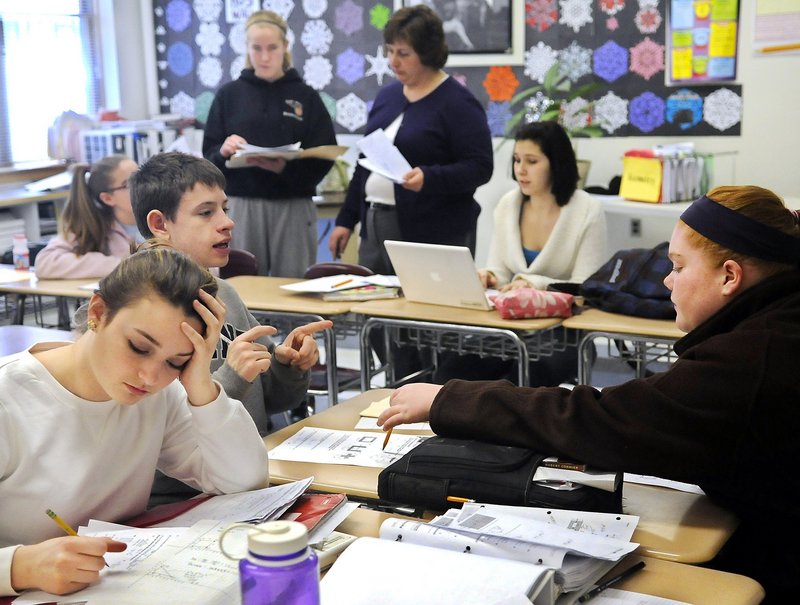DURHAM – In the next few days, all Maine’s public schools will be opening their doors for another year. We must make 2012-13 “the year of the child” in Maine and focus attention on making public schools our No. 1 priority.
Public school educators have always put our students at the top of our priorities. It is time to move our leaders in Augusta in the same direction.
Look carefully at the following information from Gov. LePage’s website: “Past education reforms have tightened the grip of union bosses and bureaucrats instead of preparing students to compete in a global economy. Together, we can create student-focused education reforms that prioritize spending so teachers, kids and classrooms have the resources for success, and will create new affordable education options for all Maine students.”
Nowhere in the governor’s introduction does it say “public education.” It is imperative that we focus school improvement and reform on public schools.
In July the governor introduced his ABCs for education.
A — Accountability. Educators agree that teachers, parents, students and elected officials should be held accountable for guaranteeing we put students’ needs first.
B — Best Practices. We believe that we should raise the bar by adequately preparing educators for the changing role of schools, and providing professional development that informs good teaching and benefits students.
C — Choice. Giving students options for where they are educated and who receives the funding that follows each child to pay the costs of education results in at least two different scenarios.
First, Maine has always had “Superintendent Agreements” to meet the needs of children who required a different placement. This agreement is between two districts at a parent’s request and is a successful alternative that keeps our students in our communities.
The second alternative is moving taxpayer dollars away from public education (including public charter schools) into the hands and pockets of out-of-state, for-profit, corporate charter schools.
Private charter schools have one incentive — making money for investors. The research has repeatedly shown that these schools perform no better than public schools, and often the results are worse.
Reforming our schools takes more than rhetoric about our failures.
This summer Gov. LePage claimed that “the College of William and Mary in Virginia … requires Maine students to take a placement examination before even considering their applications,” though this was later found to be untrue.
It turns out no one is aware of any school that requires Maine students to prove their worth. Maine schools are highly regarded and Maine’s graduates attend the same prestigious schools as students from other states.
What can we do to prepare more of our students for post-secondary success? Let’s focus on what works. Teaching students to think creatively, accept others’ differences and listen to differing opinions develops 21st-century learners. Give students the opportunity to practice creativity and problem-solving, critical-thinking and collaboration skills. Simply reciting subject matter or earning a high score on a standardized test will not prepare our students to be citizens of the future.
When our governor makes statements like “If you come from Maine, you’re looked down upon,” it degrades our students and insults our graduates.
Students, graduates, workers, businesses and educators provided testimonials saying that that simply isn’t true. Education leaders around the country are complimentary to Maine graduates, and businesses respect the work ethic and skills of Maine employees.
Untruths, half-truths and misrepresentations direct negative attention to our schools and cause taxpayers undue concern about the success of Maine’s public school students.
Out of fear of a sinking ship, residents begin abandoning our schools and finding reasons to criticize our educational system.
As President Kennedy once said, “A rising tide lifts all the boats.” Finding what works in schools and sharing these superlatives will benefit all students.
As we improve schools, increase opportunities for our students and highlight positive aspects of our educational community, the tide of redefining student success will lift all schools to higher levels of achievement.
Let’s take action now to support our schools, not denigrate them. We need honest information about the challenges that face our schools, not numbers that have been manipulated to make a point. Admittedly, not everything is perfect. We must do better for our students’ sakes.
Rather than building walls between our stakeholders — parents, educators, community leaders, businesses, professional organizations and the Department of Education — let’s spend the next 10 months honestly working together for our public school students, and lead the way to great public schools in Maine.
Lois Kilby-Chesley of Durham is a third-, fourth- and fifth-grade teacher on leave while serving as president of the Maine Education Association.
Send questions/comments to the editors.



Success. Please wait for the page to reload. If the page does not reload within 5 seconds, please refresh the page.
Enter your email and password to access comments.
Hi, to comment on stories you must . This profile is in addition to your subscription and website login.
Already have a commenting profile? .
Invalid username/password.
Please check your email to confirm and complete your registration.
Only subscribers are eligible to post comments. Please subscribe or login first for digital access. Here’s why.
Use the form below to reset your password. When you've submitted your account email, we will send an email with a reset code.